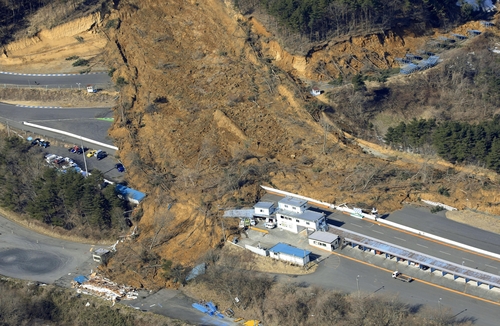Japanese media “Discriminatory remarks and rumors spread at every disaster”
Rumors that mimic the 1923 Great Kanto Earthquake come out
Some Japanese netizens “report as soon as you see” midnight voice
On the morning of the 14th (local time), the day after a 7.3 powerful earthquake in the offshore of Fukushima Prefecture, Japan, a racetrack in Fukushima Prefecture was damaged by landslides. / Photo = Yonhap News
[아시아경제 임주형 기자] After the earthquake off the coast of Fukushima Prefecture in Japan, it is known that fake news of racial discrimination has spread, centering on social network services (SNS), and controversy is rising.
On the 14th (local time), the Japanese media’Mainichi Shimbun’ published an article titled’Rumors and discriminatory remarks and how to deal with each earthquake’, and “Another discriminatory remarks and rumors over the strong earthquakes in Fukushima and Miyagi Prefectures. , Uncertain information was scattered on Twitter and YouTube,” he reported.
Earlier, at 11 pm on the 13th, a strong earthquake of 7.3 on the Richter scale occurred in the offshore of Fukushima Prefecture, Japan. As a result, in Fukushima prefectures and Miyagi prefectures, for the first time since the 2011 Great East Japan Earthquake, the’Sindo 6 River (a level where people cannot stand properly)’ was observed. According to Japanese authorities, at least 142 people have been injured in the earthquake so far, and 950,000 households have suffered power outages.
Regarding this, the media pointed out that “the same phenomenon occurs every time a disaster” and that “these remarks mimic the rumors that spread during the 1923 Great Kanto Earthquake.”
At 11:8 p.m. on the 13th, when the actual earthquake took place, an article was found on a Japanese Twitter saying that a netizen wrote, “I saw a Korean citizen burning poison in a well in Fukushima.”
On the 13th, when the earthquake occurred, a Japanese netizen spread fake news with the intention of “I saw Koreans burning poison in a well”. As of the 15th, the account has been deleted. / Photo = Twitter capture
Such fake news seems to mimic the rumors that circulated during the Great Kanto Earthquake. At that time, when rumors such as “Chosun people set fire” and “Pick the poison in the well” circulated, the Japanese vigilantes unilaterally beat and assaulted the Koreans, and thousands of Koreans died as a result.
This is not the first time that racist fake news has spread mainly on social media in Japan after natural disasters such as earthquakes.
According to the Mainichi Shimbun, in 2011, when the Great East Japan Earthquake occurred, there was a spread of groundless claims that “foreigner crimes are occurring” on social media.
In addition, when the Richter scale of 6.5 earthquake occurred in Kumamoto Prefecture, Japan in 2016, it was reported that the conspiracy theory spread on Twitter with the intention that “Koreans living in Kumamoto poisoned the wells”.
Korean bodies killed during the 1923 Great Kanto Earthquake in Japan. / Photo = Yonhap News
The problem is that unlike the Great Kanto Earthquake that was 100 years ago, fake information is spreading rapidly through social media and the like. Even if it is a rumor without ground, it can have a strong ripple effect..
As the situation is like this, voices of midnight are coming out to prevent the spread of fake news in Japan.
One netizen captured some accounts spreading rumors related to the earthquake on the 13th and emphasized, “There are good and bad things to play with,” and “You should report it as soon as you see it and stop it.”
Another netizen said, “People who ride on the earthquake and tweet hateful are ashamed,” and pointed out, “If you go abroad, you are just one of the foreigners, and you will be the object of hatred.”
Reporter Lim Joo-hyung [email protected]
– .


